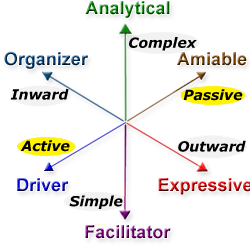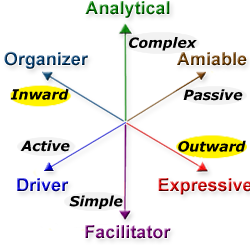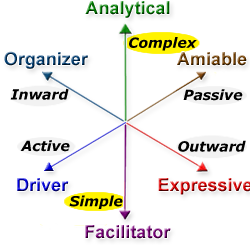
Managing Personality Styles
Personality Styles Working Together
Balancing Polarities
Interpersonal style sometimes means that successful interaction and meeting the expectations of others requires adjusting your own behavior in the mix. This may mean addressing the other person’s arena of expectations with versatility, even if it means differentiating from your comfort zone to do so. Understanding how to do that lies in understanding the Personality Types of the people involved. Are they a Driver, Expressive, Analytical, Facilitator, Organizer, or Amiable? Knowing how different personalities interact and react to each other may mean the difference between smooth transactions and conflict.
Driver
Dominant, Swift to act, Makes Statements, Leans forward, Quick Amiable
Yielding, Unhurried, Listens, Leans Back, Deliberate


take actions to…
. Volunteer information.
. Quicken your pace, get to the point
. Be willing to disagree
. Act on your convictions
. Initiate conversations
take actions to…
. Listen without interruptions
. Ask for others” opinions
. Slow down, adapt to others’ time
. Allow others to take the lead
. Negotiate decision making
Expressive
Outgoing, Flexible, Involved, Informal, Warm Organizer
Reserved, Controlled, Detached, Formal, Cool


take actions to….
. Say what you feel
. Make personal remarks/pay compliments
. Devote more time to relationships
. Engage in small talk
. Use more open body language
take actions to…
. Stick to facts/business
. Restrain enthusiasm
. Make decisions base on logic and solid evidence
. Refrain from referencing your feelings, intuition
. Acknowledge opinions of others
Analytical
Specific, Technical, Theoretical, Detailed, Researched Facilitator
General, Broad, Basic, Uninquisitive, Scanning


take actions to…
. Introduce case in point examples
. Focus on how to accomplish
. Refer to technical support
. Listen to special interests
. Examine categories
take actions to…
. Zoom out to overall strategy
. Focus on outcome
. Return to trunk instead of branches
. Squelch the data
. Put ideas over facts
Addressing Styles

Managing Yourself with
Driver Styles
| Plan Actions to be seen as… | Avoid being seen as… |
| . Concise, to the point | . Vague and time wasting |
| . Business link, result oriented | . Personal and casual |
| . Specific when asking questions | . Pretentious or irrelevant |
| . Armed with alternative and choices | . Conclusive or arbitrary when recommending |
| . Prepared with facts about the probabilities | . Careless with facts and forecasts |
| . Supportive of their conclusions | . Directive or forceful |
| . Ready to stress results | . Personalizing the decision |
| . Organized, professional, in control | . Whining, making excuses, apologizing. |

Managing Yourself with
Expressive Styles
| Plan Actions to be seen as… | Avoid being seen as… |
| . Supportive of their ideas and concepts | . Arbitrary and directive |
| . Stimulating, thought provoking | . Unyielding, too structured |
| . Willing to discuss their successes | . Too rigid about plans, existing procedures |
| . Providing ideas to put their plans into action | . Leaving decisions up in the air |
| . Seeking their opinions and ideas about people | . Wasting time on formalities and protocol |
| . Contributing idea to a plan | . Emphasizing concepts too much |
| . Offering special, immediate incentives to take a risk | . Being too logical or dogmatic |
| . Willing to socialize, take time to know them personally | . Patronizing or superior |

Managing Yourself with
Analytical Styles
| Plan Actions to be seen as… | Avoid being seen as… |
| . Well prepared, have an agenda | . Loosely organized, unstructured |
| . Direct, orderly, but patient | . Informal, too casual |
| . Oriented toward specifics | . Too general about plan |
| . Doing what you say you will | . Vague about what is expected of each party |
| . Willing to draw up a schedule with action steps | . Leaving loose ends, not geared toward follow through |
| . Amenable to verifying the plan | . Too reliant on others |
| . Having evidence, ready to follow up | . Unrealistic with deadlines |
| . Supportive of their principles, logic,
thought processes, and thoroughness
|
. Threatening, emotional impulsive |

Managing Yourself with
Facilitator Styles
| Plan Actions to be seen as… | Avoid being seen as… |
| . Efficient, ready to go | . Distracted |
| . Experienced and communicative | . Abstract and theoretical |
| . Willing to work with others | . Overly adherent to plans |
| . Contribute to and enhance the system | . Isolating methods from one another |
| . Presenting modifications | . Creating more work |
| . Meetings needs now | . Experimental |
| . Winning the support of others | . Increasing responsibilities |
| . Conformant with the system | . Going against the grain. |

Managing Yourself with
Organizer Styles
| Plan Actions to be seen as… | Avoid being seen as… |
| . Organized, methodical | . Ad hoc, without a plan |
| . Formatted and productive | . Personal and tentative |
| . Orderly in process | . Inattentive to detail |
| . Having related experience | . Inexperienced |
| . Conceptual in planning | . Subjective in presentation |
| . Creating step by step application | . Having to vision for the future |
| . Providing a higher yield versus cost | . Lacking support for proposals |
| . Adaptable to the form | . Fixed in demands |

Managing Yourself with
Amiable Styles
| Plan Actions to be seen as… | Avoid being seen as… |
| . Candid, open, patient | . Impatient, don’t force the agenda |
| . Personally interested in them | . Aloof, too business like |
| . Responsive to their ideas | . Arbitrary, overly aggressive |
| . Supportive of teamwork & harmony | . Limiting participation in the plan |
| . Having a well defined ideas, but willing to negotiate | . Pushing for a quick, intuition-based decision |
| . Supporting win-win relationships | . Pressing for an arbitrary decision |
| . Ready to provide plans that minimize risk | . Making promises that can’t be kept |
| . Willing to commit your personal time and involvement | . Manipulate or bullying |